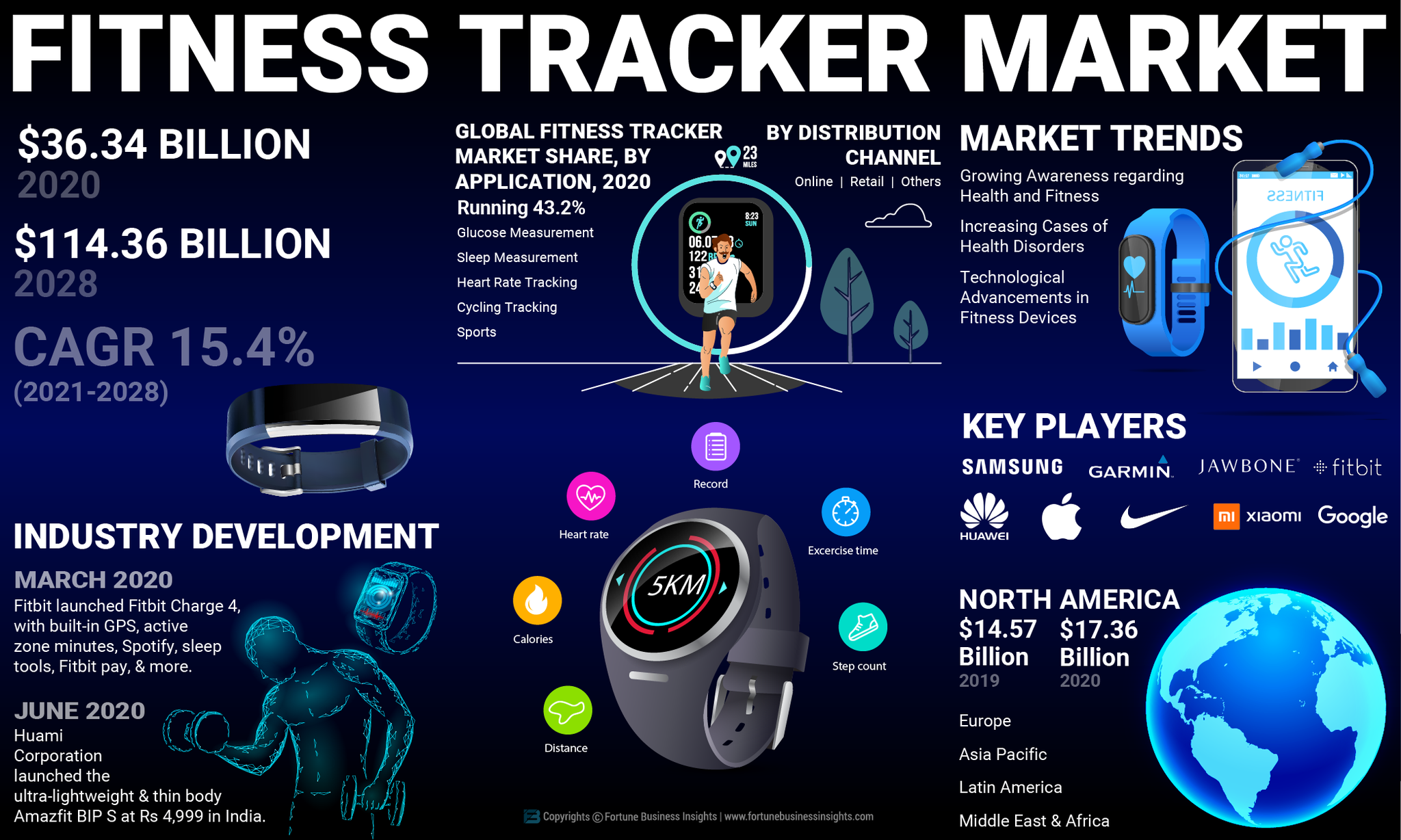A fitness tracker is a wearable device that tracks and monitors consumers’ health and provides information regarding an individual’s exercising progress. Fortune Business Insights™ estimates that the fitness tracker market will exhibit strong growth over the forecast period because of the population’s rising popularity of tracking devices. The market is anticipated to reach USD 114.36 billion by 2028, exhibiting a CAGR of 15.4% during the period 2021 to 2028.
In recent years, these trackers have been in high demand because of the incorporation of the Internet of Things (IoT) and Artificial Intelligence (AI). Companies focus heavily on launching smartwatches with fitness tracking software and sensors. For example, Huami Corporation announced its thin and ultra-lightweight Amazfit BIP for INR 4,999 in India in June 2020. Its recently launched Amazfit BIP, is powered by a built-in GPS and GLONASS dual-mode positioning, Bluetooth music control, 5ATM water resistance, 64 Gamut color display, and a sleep tracker.
COVID-19 Impact: Semiconductor Shortage to Stand as a Major Challenge for the Industry
The global COVID-19 pandemic has changed workflows and the market in general, increasing the dependence upon digital services and devices. However, the lack of manufacturing, mining, and transport led to the closure of several semiconductor companies. Further, the restrictions on and lockdowns have heavily affected the availability of semiconductors globally. As a result, smartwatches, fitness trackers, and other IoT devices’ production got hampered. The lack of stock and rising demand heavily affected the supply chain. However, robust demand for general electronics such as smartphones, TV, laptops, and others, may compel governments to undertake initiatives to overcome this massive challenge.
Rapid Digitization Globally to Increase Adoption of Electronic Devices
Governments are focusing extensively on the development of 5G infrastructures globally. The rising investments in the development of excellent connectivity and internet services are expected to boost fitness trackers’ manufacturing. The adoption of the internet is expected to enable consumers to utilize excellent cloud services that may help them gain information about their routines. The collection of fitness data to develop accurate and authentic fitness trackers allow companies to provide information regarding consumers’ activities. Companies focus on providing excellent components at various price ranges to attract consumers.
Several major OEM manufacturers such as Samsung, Fitbit, Apple, Google, Huawei, Xiaomi, and others have entered the market to provide excellent iterations of fitness trackers to people at variable price ranges.
Adoption of Cloud Services and Evolving Consumer Lifestyles to Boost Sales
Prominent companies incorporate cloud services to improve product functionality and allow users to gain accurate exercise patterns. The incorporation of the cloud may enable consumers to improve their lifestyles and gain fitness. Further, the emergence of the pandemic led to the adoption of fitness apps that track users’ health and even raise an alarm in case of irregular working of various vital organs. Furthermore, heavy investments in the development of online infrastructure may enable governments to gain information regarding public health and devise programs to ensure a fit population. Additionally, evolving consumer lifestyles, rising per-capita income, and increasing buyers are expected to bolster the adoption of the product.
Major Challenges: Rising Concerns Regarding Data Safety and Accuracy to Impede Sales
One of the major challenges that the industry may face is the rising concern regarding data gathering for cloud services. Despite the incorporation of encryption, the lack of awareness may reduce sales. Furthermore, concerns regarding the device’s accuracy and radiation caused by the device may reduce fitness tracking’s demand.
Key Players: Incorporation of Artificial Intelligence and Advanced Components to Eliminate Challenges
Google, Xiaomi, Apple, and several others are developing smart bands and trackers to provide consumers with best-in-class devices. Companies incorporate advanced chipsets, components, software, and other features to increase fitness tracker’s accuracy. For example, Fitbit announced its Fitbit Charge 4 in March 2020 with Fitbit play, Spotify, sleep tools, GPS, and other features. The emergence of online shopping and e-commerce websites may enable manufacturers to aim at major online retailers to reach consumers worldwide.
As consumers globally aim to purchase products that boost health, the demand for smartwatches and bands with fitness trackers increases rapidly. This factor encourages companies to produce better products and create innovations that boost product quality and attracts more sales.
Gramin Ltd, Apple Inc., Fitbit, Inc., Huawei Technologies, Pebble Technology Corp, Samsung Electronics Co. Ltd., Xiaomi Technology Co. Ltd., Jawbone, Nike, and others are some of the major players operating in this industry.
Conclusion
It can be observed that the demand for fitness trackers is increasing as consumers aim at purchasing devices with advanced features such as GPS, sim card functionality, IoT, artificial intelligence, and others. Governments and companies are working actively to incorporate sensors and superior components and software to track health related problems and ensure wellbeing of the population.




